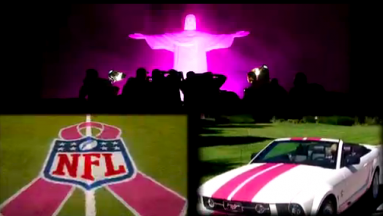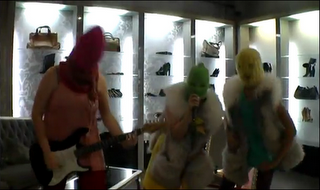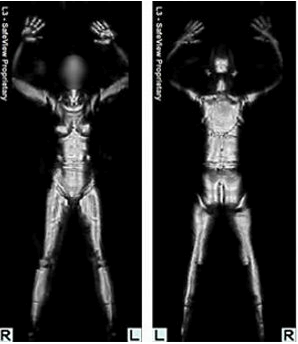...To Toe...

...And Everything In Between:
Pink Inc: The documentary Pink Ribbons, Inc., opens in New York and Los Angeles today. Pinkwashing is horrifying on so many levels—commodifying women's health issues while simultaneously depoliticizing the underlying issues is just about the cheapest way for a company to appear pro-woman, and I'm thrilled that the issue has gotten more attention. This film interviews the original creator of the pink ribbon, Charlotte Haley, who created it as a grassroots appeal to focus on prevention, only to have it usurped against her wishes by Self magazine.
There really should be a nail polish called Autumn Whitefield, yes?: Are mass-customized beauty products
on the brink of a comeback? (Side note: A beauty editor friend once got to name a nail polish shade, as a sort of bribe from a company hoping to be featured in the magazine. Foolishly, she did
not name it Autumn Whitefield.)
Innovate, deregulate: Loosely libertarian
argument against the Campaign for Safe Cosmetics, which makes the same old tired arguments about how regulation stifles innovation. ("If [Max Factor] had to obey government regulators, rather than his demanding consumers, would he have thrived as he did?" Perhaps not, but how many women have been harmed by arsenic and lead in their makeup?)
Show biz: Model agent Ben Barry, who specializes in diverse models, i.e. models outside the usual confines of thin, white, and young, on how fashion can benefit from diversifying its casting pool. It's not just theory; it's research: Women who wore clothing larger than a size 6 increased their purchase intentions threefold when shown photos of curvier models, and women over 35 doubled their buying intentions when shown models their age.
Sample size: I feel like it's not news that upscale hotels are upping the ante with their shampoos, conditioners, and body lotions. But what is news is that the hautest of the haute are now offering full-scale beauty products to guests, for a price. Wearing the custom nail color designed to match the walls of the Ace hotel is "a more discreet, insider way of wearing the 'I Heart NY' T-shirt," says the founder of a custom products company. Because surely, if you are staying at the Ace, you need to feel even more insidery.
In the pipeline: Lush continues its political actions, this time by turning their stores in Canada into polling stations to garner support for blocking an oil pipeline proposal. I'm wary of endorsing any company because I feel like there's always going to be something shady going on, but I've gotta say I dig that Lush doesn't shy away from getting political about things that actually are political, i.e. that customers could strongly disagree with, i.e. they're not slapping a pink ribbon on something and calling themselves pro-lady. (I mean, who out there is in favor of breast cancer?) Between this and a pro-LGBTQ kiss-in last year, they're doing it right, and I appreciate that.
Extravaganza!: Given the popularity of American hair shows, which focus on African American hairstyles, I was surprised to learn there aren't any hair shows in Africa—
until now, with the upcoming Hair Extravaganza in Johannesburg.
Coverup: Eman Al Nafjan, who blogs as Saudi Woman,
on a recent videotape that showed religious police harassing a woman for wearing nail polish (
video here), which makes interesting viewing coupled with
Kiana Hayeri's photo essay of Iranian women pushing cultural boundaries of modesty. I feel like just as Americans were getting used to the idea that wearing hijab could be a valid choice for a woman to make, we're getting reminders that having it be a choice is often an American luxury.

Free Pussy Riot. (Free is a verb here, yo.)
China dolls: Mume Yoshiwara has a poignant essay in
Marie Claire about becoming aware of the
"Asian beauty myth"—that Asian women are supposed to be petite, doll-like—ironically, during a trip to Japan, where her family emigrated from four generations ago: "Being an 'other' on a street—in a city, in a country, on a continent—full of Asians felt like a rebuke: Here was what I should look like, and in each person was a reminder of how I didn't. It sounds ridiculous, but I felt in those moments as if I had failed, and the feeling was one of embarrassment and apology."
Scent memory: The UK's Advertising Standards Authority
annual report reveals that an Opium perfume ad from 2000 featuring Sophie Dahl au naturel is the eighth-most-complained-about ad in the organization's history.
Esther Lee points out that perfumes have had more than their share of consumer outrage, and with good reason: Since the results are all about sea sensory effect that the ad viewer has to experience indirectly (more so than, say, lipstick or hairspray, where the viewer at least has an image of what the product should actually do), they've got to push the envelope.
Mansome: I thought
Super Size Me was the most precious blossom of low-hanging fruit, largely because I found Morgan Spurlock insufferable. That said, I'm eager to see his new documentary,
Mansome, about appearance-based pressure on men. For a warm-up, Noah Brand's
nude pictorial at The Good Men Project shows male vulnerability about nudity—no Burt Reynolds shots here, nor muscle-ripped beefcake, nor chubby-boy-being-kooky. Instead, Brand is shown being quiet, serious, imperfect, and sensual. (NSFW.) At the same time, I appreciate how Joseph Stashko at The New Statesman
neatly outlines how the overemphasis of the role of appearance in eating disorders keeps the public from recognizing that men can be afflicted with them too.
"Yes, it does feel the same": Read this story about a young black boy asking Barack Obama if "my hair is just like yours"—and
an accompanying essay hair-touching and identity—and then just
try not to look at the Obama photo and get goosebumps.
O RLY?: Mikki has
a ready response for the next time a music writer gets all Lana del Rey waa-waa about female performers changing up their look.
You lose, you lose: Average-weight women are
rated as less attractive once the rater believes the woman used to be overweight. Standard caveats about all "attractive" studies being sort of BS-y.
Body image: "Developments" in airport security might make flying a enormous pain in the ass, but the 3D body scanning technology
has potential use in eating disorder treatment, helping with the body dysmorphia characteristic of many patients' symptoms. None of this helps me figure out if deodorant counts as a liquid, though.
"Taking it all off": Stunning essay
about the potential of touch to heal, of words to wound, and of community to give permission for all kinds of nakedness. "What I long for, for myself, and for all who need it is touch that is not facilitated by capitalism. Touch that, in its demand for our vulnerability, our giving of our whole selves, does not exact from us psychic violence. Touch that is healing, and intimate, and loving, without the necessity of being sexual. And yet, access to safe, healthy sexual touch, when we want it." (via
Sally)
The price of beauty: This
Reddit thread about the drawbacks of being beautiful is fascinating. I'd say at least half of it is roted in misogynist BS, but the reasoning people come up with on this topic is revealing, as is the eagerness for people to share their stories of being discriminated against because of their good looks. I will say that one thing I've learned in writing this blog is that people—myself included—have very definite ideas about the experiences of extraordinarily beautiful women, and that the longer I research the stuff the less convinced I am that any of those ideas are rooted in some grand truth. Seeing people go hog-wild with those ideas is both grotesque (at one point a commenter semi-sympathetically shares how a friend of hers was punished for her beauty by a tragic series of incestuous attacks, as if incest is the logical end point of beauty) and illuminating. (via
Venusian Glow)
Pure beauty: On
the connection between beauty and "purity": "Beauty and purity go hand in hand, and are tied up in a false sense of modesty. ... It comes from needing to be seen as beautiful even 'without any makeup on' but in 'skin-tight jeans' if you’re Katy Perry, from Bruno Mars ‘knowing’ that 'when I compliment her, she won’t believe me,' and in reminding a boy that he should be dating a girl who isn’t a shallow hussy, if you’re Taylor Swift." (via
Rachel)
Snow White and the Seven Duhs: Aaaand the award for least imaginative movie tie-in nail polish sets goes to...Deborah Lippmann, for
the two-polish collection for fans of
Snow White and the Huntsman. One is snow! The other is blood! I don't understand how these movie tie-in cosmetics sell!
Girly girls: Now that the
Girls backlash, and the backlash to the
Girls backlash, has dwindled a bit, we can talk about the show without getting defensive, which
Alyssa Rosenberg does nicely here in discussing Lena Dunham's body and what it means for a woman who is neither aligned with typical Hollywood body standards nor overtly Othered bodies to be nude onscreen: "The geography of Hannah’s world isn’t boundaried by the countours of her body."
Classy gents: Gendered clothing is about, well, gender. But as Danielle lays out, its roots in class can't be ignored.
The spaces in between: A pair of posts on aging, but not yet aging-aging. The first is from novelist Kate Zambreno: "[T]he other day I posted on FB: Eve or Edie Sedgwick? After a realization suddenly that that has been the tension of my thirties—the intriguing girl-muse versus the brilliant hag, that mournfulness when I am realizing I certainly am no longer the one and probably not enough the other. That perhaps for me to become the other—the brilliant hag—I need to stop being so aware of things like the fact that people don't tell me anymore I remind them of Edie Sedgwick." The second is from Jay Gabler, who penned a sociological take on what being thirtysomething means today, in response to my post earlier this week about turning 36. Between shifting notions of education and markers of adulthood, is it any wonder we have experiences like the one he recounts?: "When one of the women learned I was 36, she held up her hand. 'Wow. High five for that!' For what? For still being alive? For being out on a Tuesday night? For not having kids?"
See Jane run: Crap, I was so pissed at xoJane for that whole "juice fasts! not so bad!" eating disorder bullshit that I'm pretty sure has gone some ways to fuck people up, and I swore I'd never link to them. But then, on top of the ever-intriguing case of Cat Marnell, they go and hit two home runs in one week:
how sexual objectification of men illuminates the connection between objectification and oppression, and a
piece from a Chassidic woman clearing up some misconceptions about Orthodox Jewish life. (Warning: May make you want to go to a mikveh.) I also appreciate the frankness of
this piece about having meaningless tattoos, which I can't fathom doing, but hey! that's why we have personal essays. I wish xoJane could either just be at their best or become so terrible as to be irrelevant, but I suppose that's part of their point—that glossing over our flaws isn't helpful?
You can call me Hal: In case you missed its earlier inarnation at The State,
Rahel Aima's revised essay on the feminization of The New Aesthetic is a must-read if you're interested in visual culture even in the slightest. "The New Aesthetic is about being looked at by humans and by machines—by drones, surveillance cameras, people tagging you on Facebook—about being the object of the gaze. It’s about looking through the eyes of a machine and seeing the machine turn its beady LEDs on you. It’s about the dissolution of privacy and reproductive rights, and the monitoring, mapping, and surveillance of the (re)gendered (re)racialised body, and building our own super-pervasive panopticon. ... Now do you know what it feels like for a girl?" Plus, the makeovers of the future, the valorization of feminized labor, and more.


